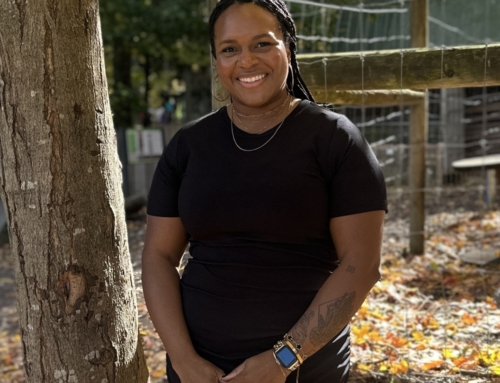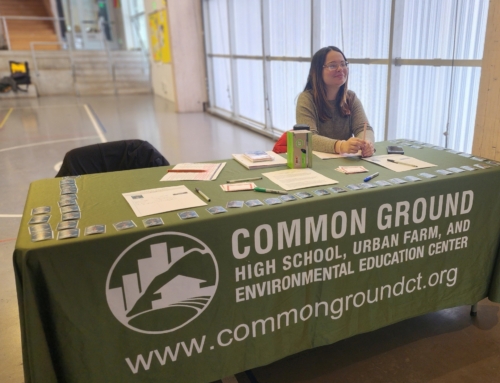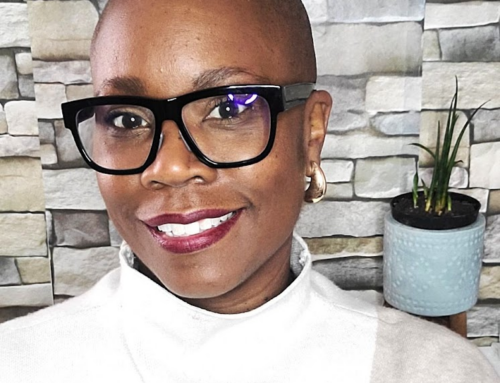by Joel Tolman, Director of Development & Community Engagement
We have just closed out an anxious time of year for students and teachers — at Common Ground, and across Connecticut. Over the last two weeks, our students have survived a battery of serious, concentrated testing: the Connecticut Academic Performance Test.
These tests have real stakes. Students must prove proficiency on them to graduate. Starting next year, these tests are one of a number of measures we use to determine whether Connecticut teachers are doing their job well. Test scores help families decide where their students go to school, and whether charter schools like Common Ground can keep their doors open. They are not the most important yardstick for measuring our students’ progress. But they do matter, in very real terms.
We — students, educators, schools, families — get to decide how we respond to these tests. We can decide to ignore them. We can cancel classes for a month to focus on test prep. We can even push low-performing kids out of our schools — traditional, magnet, charter — in a truly perverse response to the challenges they pose.
Or we can raise the stakes. We can turn these tests into something that matter in a much more authentic sense — into a tool for building a community that tackles real issues, has serious conversations, does significant work. At Common Ground, this is the strategy we’ve been trying to put into action. Here’s how it’s worked this winter and spring:
We invite students to tackle real issues that hit close to home
On the CAPT writing test, students have to read two articles and write a letter to a decision-maker sharing their point of view on the issues raised by these articles. These articles can be about anything: legalized gambling, vending machines, even (theoretically, at least) the practice of making our students take standardized tests.
At Common Ground, we’ve built practice tests — “benchmark assessments” — to get our students ready for the real thing, and to give our teachers data on how our students are doing. The topics we choose are not randomly picked from released test items from the State Department of Education. When English teacher Keith Lambert designed our most recent benchmark, he looked for issues that relate directly to our students, and to our school’s environmental mission.
When students sat down to take this benchmark assessment, they read about the successes and challenges of the effort to introduce healthy foods to corner stores across New Haven. They tackled articles from CNN Money and The Atlantic, as well, asking whether large food companies should be held accountable for the obesity epidemic and other challenges. They took part in a mini-lesson, including a presentation that shared statistics, quotes, and information graphics. They brainstormed some ideas on their own. They talked to their classmates. And they sat down to write — pretty powerfully, in many cases — about their response to a common prompt:
[quote]New Haven currently has 47 restaurants listed as “fast food” and corner stores on nearly every street. With the recent increases in obesity across our nation, many are searching for solutions to this health crisis…and many are blaming the businesses that market unhealthy foods. These businesses, however, defend their practices: they are only supplying a demand, and customers have a choice. Should businesses like corner stores and fast food restaurants take responsibility for the health of their customers? Write an argumentative essay explaining whether or not it is their responsibility to sell healthier products. Support your claim with evidence from what you have read and viewed.[/quote]
We set a higher standard
So far, so good. The topic’s important. The sources are real. Students are preparing for a test, but they’re also learning about something that actually matters.
But here we come to a problem. The truth is that the tests our students take are not nearly challenging enough.
We are lucky, at least, that Connecticut’s state tests are not stupid. The writing test is a good example: We want our students to be able to synthesize multiple points of view, take a stand, and express their ideas clearly. In math, students have to tackle messy, real-world problems, and get some credit for showing a good problem-solving approach even if they made a calculating error. In science, they evaluate potential sources of error in lab experiments. These things matter.
But the bar set by CAPT is almost certainly too low. Students can earn a “proficient” score by getting 10 points on a 48 point math test. Similarly, the writing test doesn’t demand the quality of work we seek in our students. Students look only at two written sources, handed to them on a platter, rather than having to find and validate their own sources. They do not have to use human sources, or multimedia ones, to complement these written ones. Students have to take a stand and defend it, start to finish, without admitting that there are other valid points of view — not the sort of critical, civil discourse that we would love to see in our community and politics.
So, when Keith Lambert designed our benchmark, he didn’t aim to replicate the CAPT test. He looked at the new Common Core State Standards — adopted by Connecticut, and starting to re-shape our state-wide tests as soon as next year. “One of my favorite things about Common Core standards is that they’re pushing from persuasive to argumentative writing, from 5-paragraph essays to something much more sophisticated. I always felt dishonest teaching students how to make a point while disregarding every other possible point of view, often at the expense of the truth. Argumentative writing is about engaging in a conversation –- understanding the other side, not just presenting their own. It’s preparing them for the CAPT test, but in a way that helps them move beyond.”
The change presented by the new standards is about how we get our information, as well as how we express our ideas. “Students are challenged to draw from multiple sources, to do some research on their own. It’s presenting information in the way that humans actually gather information. We get our information from multiple sources. We read an article. We see a YouTube video.”
It’s with these higher, more challenging, more real standards in mind that we designed our new benchmark assessments. Are we worried that students are practicing a test that holds students to a different standard, and that uses a different format, than they’ll see on state tests? Keith Lambert is not concerned. “Anyone who does well on our benchmarks is going to annihilate the CAPT.”
We use the test to start a community conversation
This work to raise the bar brings us to the edge of the most exciting — and almost always missed — opportunity presented by these standardized tests. Each year, every student in our school sits down to read the same set of sources, form a position, and communicate that position clearly and powerfully. Yet we almost never ask them to share that opinion with anyone but the test graders, or to consider the positions of others. They almost never join in conversation with members of the bigger community — policy-makers, concerned citizens, their parents.
This Spring, we tried using these benchmark tests to spark a real conversation. It started small: students turned and talked to their peers before they hunkered down to write their own essays. This should not be a novel idea. In real life, who takes a stand on an issue without talking to someone else about it first? Would we really want our students to form a strong opinion without considering the opinions of the people around them?
The conversation continued after students were done writing. A week after the benchmarks, a student at the Yale Divinity School asked if Common Ground would like to present at a conference on food justice. Farm Manager Shannon Raider, Social Studies teacher Jeremy Stone, and Sarah Tracy-Wanck — whose work at Common Ground is to engage our students as food justice leaders out in the community — met to figure out how to respond to this invitation. They realized how much our students could add to the conversation. Sarah combed through students writing and identified students with a variety of points of view, all clearly and convincingly expressed. While students were stuck at home during the blizzard, she sent out emails inviting 15 of our students to join in the conversation. Nine responded right away.
Sarah brought these students together to plan a panel discussion for an audience of Yale students and community food leaders. Students kicked off the discussion by asking whether food companies are responsible for the health of their customers, and shared a variety of points of view. They drew on what they’d written for the practice tests, but moved beyond those essays as well. Some had even switched sides, based on the conversations they’d had with their peers.
Then our students invited other experts into the conversation: Adan Martinez, a Yale Forestry student with years of commercial farming experience; Amy Christensen, who manages Elm City Market, New Haven’s cooperative grocery store; and Margaret Read from Yale’s Rudd Center for Food Policy & Obesity. Jeremy Stone, who teaches Common Ground’s Food & The Environment course, facilitated the discussion. Students asked questions, which the “experts” turned right back on the students. Then they invited the audience to join the conversation.
“Audience members were not really sure what students were bringing to the table,” says Sarah. “It was immediately clear that students really knew what they were talking about. They were synthesizing a huge amount of learning they were doing. Some of them referred to their classes. Others had clearly done additional research on their own. They weren’t sitting there tongue-tied. They weren’t hesitant to take responsibility.”
And last week, just as students finished up the real CAPT test, our community rejoined the conversation — this time with about fifty of our students’ families in the room. At our spring awards banquet, students again posed the question of who’s responsible for the health impacts of the foods we eat. They were supposed to keep it to five minutes, to just share their ideas and move on. But they couldn’t help themselves. At the end of their presentations, the students invited their parents, younger siblings, and peers to respond to what they’ve heard. These students have learned the power of a community to answer questions that really matter.
But what about the numbers?
This series of events, taking place this Winter and Spring, is the latest iteration of something we’ve been working on for a while at Common Ground — and that we’ll continue to work on for a long time yet. Five years ago, we admitted to ourselves that our students’ scores on state tests told us that we were failing kids that we loved. Less than 40% of our students were proficient readers. We weren’t doing much better in writing. Whatever we thought of standardized tests, we could say with a lot of certainty that this was not good enough.
We responded in a lot of different ways to these results. One of the amazing things about being a small, stand-alone public charter is that we really could decide our course, set our keel, and row together. We focused on school culture, on creating an environment where students showed up expecting that they would learn and lead every day. We teased apart state standards to understand the skills and concepts that matter most to our students’ success. Because we’re an environmentally themed urban charter school, we anchored these skills and concepts to real issues and real work in our immediate community. We got serious about data, using our students’ work to understand how we needed to change our teaching. We worked like mad, and our students did the same.
Five years later, nearly 90% of our students are proficient readers and writers, according to the CAPT. They’re beating the state average in both subjects. In every subject, the percent of students earning proficient scores has doubled. We also moved on some other, probably more important, numbers. 97% of our students are getting into college. Our 4-year graduation rate is 10 points above the state average. When we survey them, nearly all describe themselves as leaders, and nearly all say that community members have a responsibility to their fellow human beings.
Are we done? Absolutely not. As we already admitted, CAPT proficiency does not set a high enough bar. We need to raise the standards, and push and support our students to reach them.
And standardized tests are not just about the numbers. They are an opportunity to get a whole community talking — in an informed and civil way — about things that really matter.
We hope you’ll join the conversation.
[button url=”http://www.commongroundct.org/2013/03/students-join-the-conversation-who-is-responsible-for-the-health-consequences-of-the-food-we-eat/” target=”_blank”]Read excerpts of our students’ writing »[/button]





Leave A Comment